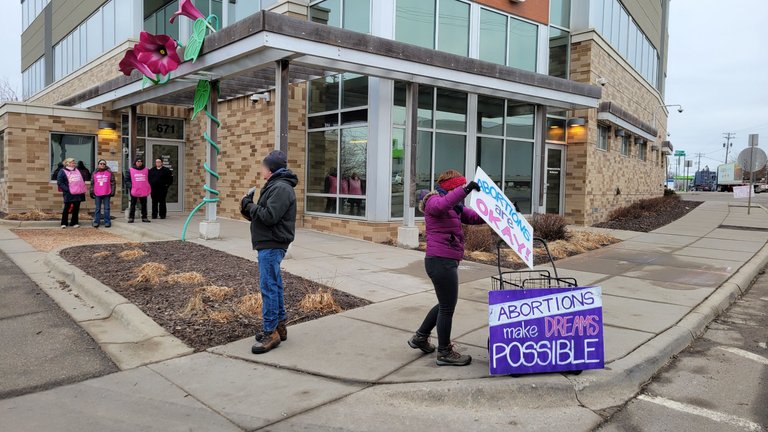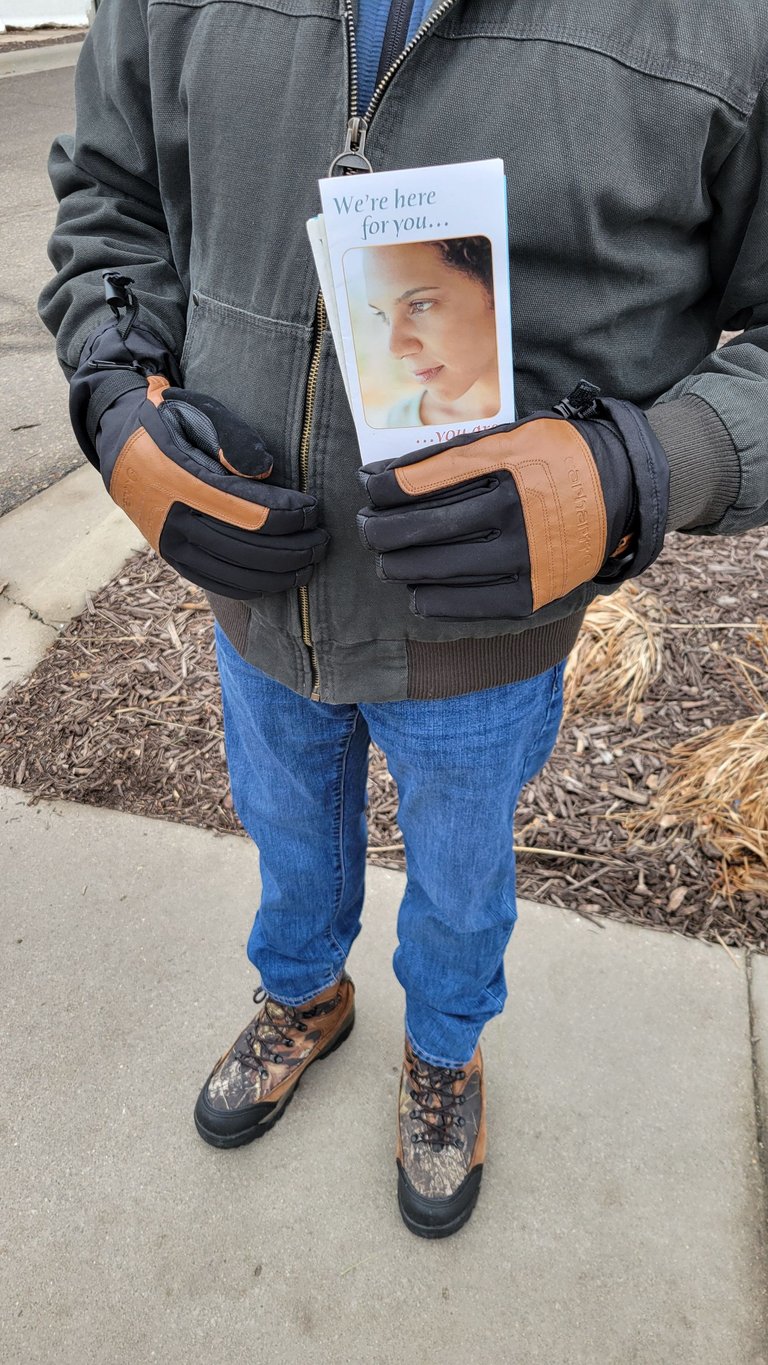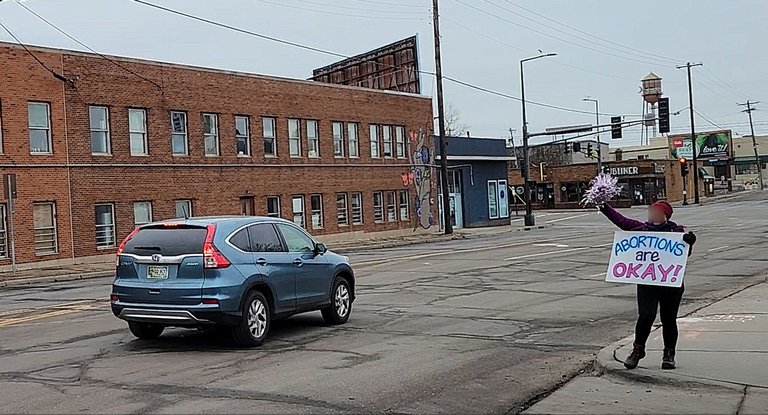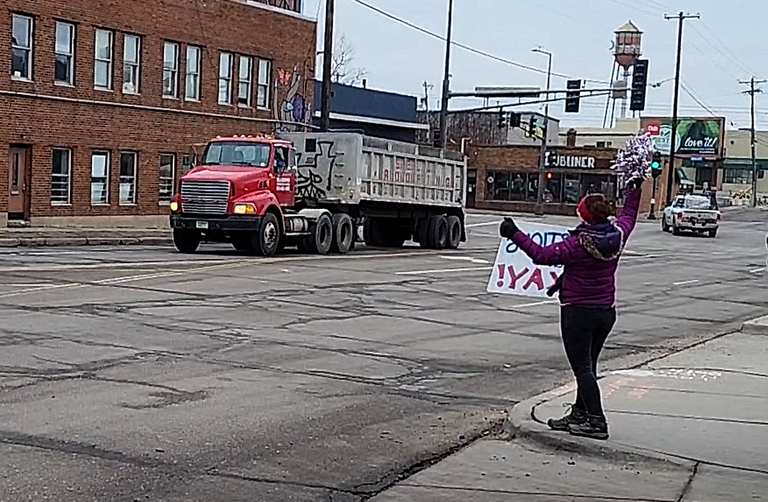Yesterday I drove by the Planned Parenthood in St. Paul. While a man kneeling on the corner prayed for the unborn, a woman on the sidewalk in front stood next to her brightly-colored sign reading: "Abortions Make Dreams Possible".

We've known these clinics to be ground zero for the abortion debate, but I just had to stop to explore how the discourse has become this extreme.
I approached the woman along with a few others near her, sharing I was there to document the scene and planned to take some photos.
"Who are you? Who are you with?" the woman snapped before I got close.
"I'm Brandon Ferdig. I do my own stories, mostly on social media."
"Oh, so you're a content farmer looking for clickbait?"
"Look, I just won't talk to you," I replied. "You don't seem open to that, so don't worry about it."
I struck up a conversation with a nearby man, R, who is 60. It turned out he was advocating against abortion.
"I do feel like the unborn need someone to stick up for them," he explained. "People don't have a right to take their life. They're not slaves."
He had brochures for arrivals to the clinic willing to take them.
"Sometimes they stop and roll down their window," he said.
The brochures offer alternatives to abortion, such as childcare resources and adoption services. He said Planned Parenthood doesn't offer women these options—that they're "pressured" into abortion.

"That's what [Planned Parenthood] gets paid to do," he said. "They're salespeople."
Asked about cars driving by honking, he said, "Sometimes people get out and scream obscenities."
Right on cue, a middle-aged woman in an SUV slowed and screamed out her window "Get a life!" to the man and another nearby, who happened to be getting an earful from the woman with the signs.
Several other vehicles, mostly large trucks in this industrial area, honked as they passed. I'm not sure who their target was.


Meanwhile, the usual pink-vested Planned Parenthood volunteers were right outside the entrance, there to see patients come and go safely.
I asked one old man in pink what he made of the scene this morning.
"If they're on the sidewalk, they can do what they want," he said of the demonstrators.
He was shy to share anymore. Too bad because the next question I wanted to ask was what he thought of the woman and her signs—if he saw it in a "Miss, thank you for advocating for the right to choose, but you're not helping" kind of way.
By this time, the woman was less suspicious of me and said I could walk with her to her car. She was packing up for the day.
I first asked about those signs, another of which read, "Abortions Are a Blessing".
"Being able to access abortion when there is a (health) threat is a blessing," this woman who appeared to be in her 40s explained.
While I understood the reasoning, I could also still feel the residual shock of first seeing those words, how they described a situation—that, at best, could be seen as a deeply unfortunate necessity—as a "blessing."
I wondered where that motivation came from.
"They've created a forum for public debate," she said of the anti-abortion demonstrators. "So I've entered their forum."
Who knows what all motivates her advocacy, but, at least on the surface, she explained it as a response to the opposing side. It seems no matter the issue these days (immigration, COVID measures, or abortion), people increasingly see the "other side" as a threat. This causes more of them to become triggered, closing the door not just to reconciliation with those holding opposing viewpoints but also to rationality.
The major catalyst for this polarization is the internet. Fittingly, my surprise at seeing these signs had my first thought be, "Man, how would Twitter react if it saw this?!" Indeed, I would've been engagement farming just as the woman suspected. Then, my second thought was to park the car and investigate. And when I did, standing next to her car, this woman who asked I not use her name softened and spoke about her true desires being there.
"I know I'm helping," she said.
I felt for her.
She let her triggered reaction toward others limiting a human's choice lead her to dismiss the very essence of humanity coming into being.
These kinds of overreactions are now normal, though, affecting those who experience them, those attacked by them, and all along, the issues themselves remaining unresolved. And abortion might be the most challenging of all the issues—it dealing with such intimate matters, leading to such a magnitude of fatality, and there being no scientific solution in sight. So then it comes down to simply reducing the need/preference for the procedure. But a big part of this comes from strong, supportive communities and reverence for humanity—which are being severely weakened when polarization and reactivity lead the way.
Congratulations @fedoraonmyhead! You have completed the following achievement on the Hive blockchain And have been rewarded with New badge(s)
Your next target is to reach 30000 upvotes.
You can view your badges on your board and compare yourself to others in the Ranking
If you no longer want to receive notifications, reply to this comment with the word
STOPCheck out our last posts: